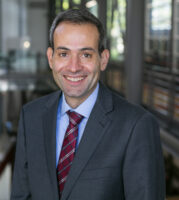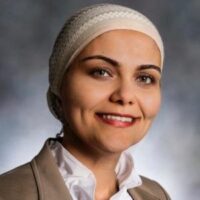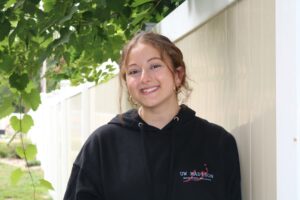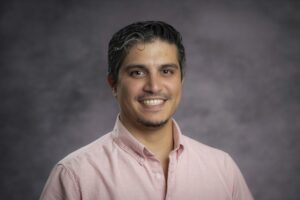March is Middle Eastern and North African (MENA) Heritage Month at UW–Madison. We asked some MENA leaders across campus to share their thoughts about MENA Heritage Month and how the community can meaningfully engage with the celebrations. We heard from Ibrahim Baalbaki, an advisor with the Center for Educational Opportunity (CEO); Yaron Nili, SJD, LLM, professor of law; Marwa Shalaby, PhD, assistant professor in Gender and Womens Studies and Political Science; and Dana Tabaza, MENA programming intern at the multicultural student center.
Note that quotes have been edited for clarity and conciseness.

What does MENA Heritage Month mean to you?
Yaron Nili: As someone with Iranian and Tunisian heritage, MENA Heritage Month is an opportunity to appreciate, celebrate, and share the history, food, and diverse culture of the MENA with others in my community. By sharing my favorite dishes with friends and family, I can bring my childhood memories to life and share moments dear to my heart about my family history with my kids, extended family, and friends.
Marwa Shalaby: MENA Heritage Month is an opportunity to celebrate our beautiful culture, challenge stereotypes, build bridges of mutual understanding and respect, and participate in fun activities with our colleagues. This year, we are also celebrating the holy month of Ramadan—a double celebration for the MENA community!
Ibrahim Baalbaki: MENA Heritage Month is new to me, but it is a way to celebrate my culture and heritage. It’s most genuine when efforts to celebrate include members from the culture.
Dana Tabaza: MENA Heritage Month is more than just a celebration of our beautiful heritage; it embodies a collective effort created by our student advocacy to make MENA students visible on campus. It’s an opportunity to feel like their identities are seen and worthy of celebration, and it is a reminder that their contributions are crucial to the fabric of UW–Madison. MENA Heritage Month marks the beginning of our journey towards recognizing our identity at UW and building an ecosystem of support where MENA students can flourish. I hope this month serves as a reminder for students to exist boldly and take up space unapologetically wherever they are.
The Middle East is one of the most vibrant and diverse regions in the world. It is the home of the world’s oldest cultures and civilizations. – Marwa Shalaby

What do you wish everyone knew about the MENA community?
Dana Tabaza: I wish people knew our community beyond news headlines and stereotypes that show a biased, misguided perception of our people. Our region is diverse, from cultural traditions, cuisine, clothing, languages, and much more, each aspect contributing to our vibrant mosaic. It is a beautiful blend of modernity woven into a rich history. The MENA region is also a cradle of artistic brilliance, scientific innovation, and linguistic richness, reflecting centuries of human achievement. The warmth, hospitality, and resilience inherent in our people showcase the strength and vibrancy of our collectivist culture, a cornerstone of our identity. This echoes a core principle instilled in me from a young age: the value of success is measured by its ability to improve the well-being of a community. By sharing this glimpse into our world, I hope you can see MENA through our eyes, away from the misconceptions that trail behind us.
Marwa Shalaby: Despite the tragic news and horrifying images of the ongoing conflict in the region, the Middle East is one of the most vibrant and diverse regions in the world. It is the home of the world’s oldest cultures and civilizations. I urge you to learn one of the region’s languages, sign up for a study abroad, or even try a new dish representing the region’s rich history and diversity.
Ibrahim Baalbaki: While there is often a shared history of colonialism with the MENA community, it is a religiously, ethnically, racially, and linguistically diverse community. Also, many Arab communities have been around for a long time, with the first wave of immigrants starting in the second half of the 19th century.
Our region is diverse, from cultural traditions, cuisine, clothing, languages, and much more, each aspect contributing to our vibrant mosaic. It is a beautiful blend of modernity woven into a rich history. – Dana Tabaza

What can the allies do to learn more and meaningfully engage in MENA Heritage Month? What resources are available to learn more about MENA Heritage?
Ibrahim Baalbaki: Challenge the narrative of what you often get from the mainstream. Seek out perspectives and different narratives from people from the community. Call me old school, but I like to start at the library. Google can be helpful, but you always have to be careful. Also, there are creative people on TikTok and Instagram and actors who give glimpses into life as an Arab-American.
Dana Tabaza: A great place to start is to come to our events! MENA people love sharing our cultures and inviting people to experience our traditions. To engage with MENA Heritage Month, I encourage you to fully immerse yourself in every aspect of our events, talk to our community members, and ask questions. If you want to learn more about our heritage, I recommend you be intentional about the resources you seek, as our history has often fallen victim to foreign authorship. I encourage you to explore a broad spectrum of content—from literature and art to music and film—created by voices within the MENA world to actively amplify our community’s rich stories.
Marwa Shalaby: Take one of my undergraduate classes! I teach courses on Middle East Politics, Gender, and Women’s Rights in the Middle East, and Gender and Islam. Also, make sure to attend the Middle East Program (MESP) events. They offer a variety of events and are organizing a major conference in a few weeks. Don’t forget to check it out.
Challenge the narrative of what you often get from the mainstream. Seek out perspectives and different narratives from people from the community. – Ibrahim Baalbaki

Leaders within the MENA community you look up to?
Dana Tabaza: An inspirational leader I look up to is Bisan Owda. Bisan is a 25-year-old Palestinian filmmaker who has taken on the role of a war journalist since the beginning of the ongoing genocide in Gaza. Her love for life and bravery are woven into her storytelling, where she amplifies the voices of those who have been dehumanized and silenced. Bisan has continuously risked her life to expose the realities of civilian life under occupation and oppression. She epitomizes the resilient and unwavering spirit of the Palestinian people, who have remained steadfast in the face of decades of hardship, injustice, and ethnic cleansing.
Ibrahim Baalbaki:
Linda Sarsour—She represents my generation and is a powerful voice for Arab Americans.
Ghassan Kanafani – I think as a writer and in his political thought, he very eloquently captured the feelings of not only Palestinians but also of colonized people around the world.